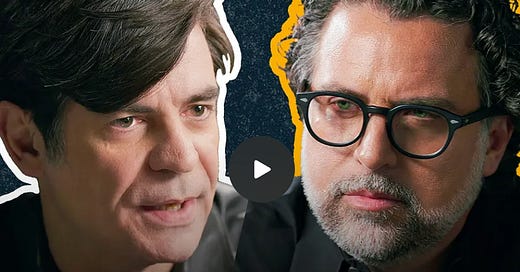RFK, Jesus, and 2025
I have an intense, wide-ranging conversation about conspiracy thinking, human progress, and man's search for meaning with John Papola for his great podcast Dad Saves America.
I’m on the latest episode of the excellent podcast
, which is hosted by the filmmaker , who may be best-known for ‘Fear the Boom and Bust,’ the massively popular 2010 rap battle video featuring John Maynard Keynes and Freidrich Hayek throwing down over economic theory. If you haven’t seen it—or watched it recently—take the time to do so. Produced with economist , it’s a really amazing piece of work that is simply inconceivable in a pre-internet cultural world.John has been making interesting stuff for decades, at places like Nickelodeon and MTV and his own shop Emergent Order. Check out his Wikipedia page and Emergent Order’s home page for more on him. And, of course, subscribe to his Substack here.
You can scroll down to start watching or listening. I’ve tossed in links to the YouTube,
Here’s how John writes up the episode:
I sat down with Nick Gillespie, editor-at-large at “Reason” and a leading voice in libertarian thought, to explore how we find meaning and purpose in a world defined by freedom and complexity. We examine the rise of conspiracy thinking, the role of religion in liberal societies, and the challenges to social and psychological stability amid rapid economic and technological progress. Nick reflects on the styles of RFK Jr., Trump, and Ron Paul and highlights the impacts of personality-driven politics. In an era of shifting cultural norms and institutional distrust, we need leaders who can confront the darker aspects of the world while also fostering genuine community and championing principled action….
Outline:
[0:00] How did RFK Jr. become a thought leader on the right?
[4:00] Conspiracy, emergent order, and leadership
[16:32] Is Trump’s personality his greatest strength?
[27:25] Abundant wealth and mental anguish
[39:02] Progress complicates our search for meaning
[48:14] Do healthy cultural norms take care of themselves?
[1:05:01] Freedom, institutions, and Catholicism
[1:10:53] Where do we go next after New Atheism?
[1:16:34] Religion is stronger without state involvement
[1:21:19] Can liberalism survive without Christianity?
[1:31:48] What work needs to be done to advance liberty?
[1:39:41] Parental authority requires responsibility
Watch the video version on YouTube:
Make a tax-deductible donation to Dad Saves America: https://secure.anedot.com/emergent-order-foundation/dad-website?
Visit our website: https://www.dadsavesamerica.com/
You can also listen on Substack:
Or on Spotify:
Or on Apple:
FWIW, here’s a summary of our conversation from Otter.ai, the auto-transcription service I use. Curious if you think this is a good representation of our talk:
Nick Gillespie and John Papola discuss the complexities of modern politics, focusing on RFK Jr.'s unexpected role in a right-wing coalition and his conspiracy theories. They explore the absurdities of contemporary political figures and the broader implications for societal meaning. The conversation touches on the tension between conspiracy thinking and the reality of individual agency, the role of leadership, and the evolving nature of societal norms. They also delve into the paradox of material progress coexisting with declining mental health, the importance of historical context, and the need for new institutions to provide meaning in a rapidly changing world. Nick Gillespie discusses the role of religion and atheism in human progress, emphasizing the importance of communities of meaning. He reflects on his Catholic upbringing and the intellectual ferment within various religious traditions. Gillespie argues that liberal political philosophy, rooted in Christian principles, has driven social evolution. He critiques utilitarianism as philosophically flimsy and stresses the need for understanding historical context to inform present choices. Gillespie also highlights the importance of parenting and the role of fathers in society, advocating for intentionality and emotional support. He concludes by emphasizing the value of freedom and the need to adapt positive societal innovations.
Let me know what you think of this conversation! And please share both it and my Substack with anyone you think might be interested.




